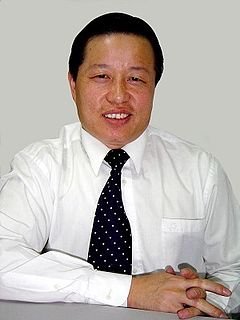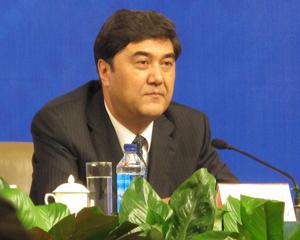Related Research Articles
Human rights in China is periodically reviewed by the United Nations Human Rights Committee (UNHRC), on which the government of the People's Republic of China and various foreign governments and human rights organizations have often disagreed. PRC authorities, their supporters, and other proponents claim that existing policies and enforcement measures are sufficient to guard against human rights abuses. However other countries and their authorities, international non-governmental organizations (NGOs), such as Human Rights in China and Amnesty International, and citizens, lawyers, and dissidents inside the country, state that the authorities in mainland China regularly sanction or organize such abuses. After Xi Jinping succeeded General Secretary of the Communist Party of China in 2012, human rights in China have become worse.

The Uyghur or Uighur language, is a Turkic language with 10 to 15 million speakers, spoken primarily by the Uyghur people in the Xinjiang Uyghur Autonomous Region of Western China. Significant communities of Uyghur speakers are located in Kazakhstan, Kyrgyzstan and Uzbekistan and various other countries have Uyghur-speaking expatriate communities. Uyghur is an official language of the Xinjiang Uyghur Autonomous Region and is widely used in both social and official spheres, as well as in print, television and radio and is used as a common language by other ethnic minorities in Xinjiang.
Huang Qi is a Chinese webmaster and human rights activist. He is the co-founder of Tianwang Center for Missing Persons, along with his wife Zeng Li. Initially the mission of the organization was to help counter human trafficking that had become a swelling problem in the late 1990s, but later it was expanded to include campaign against human rights abuse. Huang is also the owner and webmaster of 64tianwang.com, a website originally intended to release news about people who had disappeared in the People's Republic of China.

Rebiya Kadeer is an ethnic Uyghur, businesswoman and political activist. Born in city of Altay of China, Kadeer became a millionaire in the 1980s through her real estate holdings and ownership of a multinational conglomerate. Kadeer held various positions in China's parliament and other political institutions before being arrested in 1999 for, according to Chinese state media, sending confidential internal reference reports to her husband, who worked in the United States as a pro-East Turkistan independence broadcaster. After she fled to the United States in 2005 on compassionate release, Kadeer assumed leadership positions in overseas Uyghur organizations such as the World Uyghur Congress.
Freedom of religion in China is provided for in the Constitution of the People's Republic of China, with an important caveat: the government protects what it calls "normal religious activity," defined in practice as activities that take place within government-sanctioned religious organizations and registered places of worship. Although the dynastic governments of imperial China also claimed responsibility for the practice of religion, human rights bodies such as United States Commission on International Religious Freedom (USCIRF) have criticized this differentiation as falling short of international standards for the protection of religious freedom.

Gao Zhisheng is a Chinese human rights attorney and dissident known for defending activists and religious minorities and documenting human rights abuses in China. Because of his work, Zhisheng has been disbarred and detained by the Chinese government several times, and severely tortured. He last disappeared in February 2009 and was unofficially detained until December 2011, when it was announced that he has now been imprisoned for three years. His commitment to defending his clients is influenced by his Christian beliefs and their tenets on morality and compassion.

Kashgar Prefecture, also Kashi Prefecture, is located in southwestern Xinjiang, China. It has an area of 112,057 km2 (43,265 sq mi) and 4,499,158 inhabitants at the 2015 census with a population density of 35.5 inhabitants/km2. The capital of the prefecture is the city of Kashgar which has a population 506,640.
Thomas Lubanga Dyilo is a convicted war criminal from the Democratic Republic of the Congo (DRC) and the first person ever convicted by the International Criminal Court (ICC). He founded and led the Union of Congolese Patriots (UPC) and was a key player in the Ituri conflict (1999–2007). Rebels under his command have been accused of massive human rights violations, including ethnic massacres, murder, torture, rape, mutilation, and forcibly conscripting child soldiers.
Adel Noori is an Uyghur refugee best known for the more than seven years he was wrongly imprisoned in the Guantanamo Bay detention camps, in Cuba. His Guantanamo Internment Serial Number was 584. Joint Task Force Guantanamo counter-terrorism analysts report that he was born on November 12, 1979, in Xinjiang, China.
Arkin Mahmud is an Uyghur refugee best known for the seven and a half years he spent in the United States Guantanamo Bay detention camps, in Cuba.
Starting in 2002, the United States government detained twenty-two Uyghurs in the Guantanamo Bay detainment camp. The last three Uyghur detainees, Yusef Abbas, Hajiakbar Abdulghupur and Saidullah Khalik, were released from Guantanamo on December 29, 2013, when they were transferred to Slovakia.
Edham Mamet is an Uyghur refugee best known for the more than seven years he spent in the United States Guantanamo Bay detention camps, in Cuba. He was captured in Afghanistan in November 2001. Joint Task Force Guantanamo counter-terrorism analysts estimate Nag Mohammed was born on May 4, 1975, in Ghulja, Xinjiang, China.

Huseyincan Celil is an Uyghur holding Chinese and Canadian citizenship. He was the subject of a controversial court case in 2006 when he was arrested in Uzbekistan, extradited to China against the objections of the Canadian government, and sentenced to life in prison on charges of terrorism. The conviction was based on his supposed identification with a man called Guler Dilaver, who had been wanted in Kyrgyzstan for terrorism charges.
The Zirve Publishing House murders, called the missionary massacres by Turkish media, took place on April 18, 2007, in Zirve Publishing House, Malatya, Turkey. Three employees of the Bible publishing house were attacked, tortured, and murdered by five Muslim assailants.

Nur Bekri is a former Chinese politician of Uyghur origin, best known for his term as Chairman of the Xinjiang Uyghur Autonomous Region, a vast region in Northwestern China, between 2008 and 2014. Between 2014 and 2018, he was Vice Chairman of the National Development and Reform Commission and Director of the National Energy Administration, with rank equivalent of a minister. Bekri was one of the highest ranked ethnic minority officials in the Chinese government.

Chen Shui-bian, former President of the Taiwan, stepped down on May 20, 2008, the same day that Ma Ying-jeou took office as the new President of the Republic of China. About an hour after he left the Presidential Office Building, as a former President of the Republic of China and no longer enjoying presidential immunity, he was arrested and restricted from leaving the nation by Taiwanese prosecutors due to allegations of corruption and abuse of authority. Chen was accused of fraud in a case involving the handling of a special presidential fund used to pursue Taiwan's foreign diplomacy. However, the Special Investigation Division dropped money-laundering charges because of a lack of evidence.

The July 2009 Ürümqi riots were a series of violent riots over several days that broke out on 5 July 2009 in Ürümqi, the capital city of the Xinjiang Uyghur Autonomous Region (XUAR), in Northwestern China. The first day's rioting, which involved at least 1,000 Uyghurs, began as a protest but escalated into violent attacks that mainly targeted Han people. China's People's Armed Police were deployed and two days later hundreds of Han people clashed with both police and Uyghurs. PRC officials said that a total of 197 people died, most of whom were Hans, with 1,721 others injured and many vehicles and buildings destroyed. Many Uyghurs disappeared during wide-scale police sweeps in the days following the riots; Human Rights Watch (HRW) documented 43 cases and said figures for real disappearances were likely to be much higher.

The Shaoguan incident was a civil disturbance which took place overnight on 25/26 June 2009 in Guangdong province, China. A violent dispute erupted between migrant Uyghurs and Han Chinese workers at a toy factory in Shaoguan as a result of false allegations of the sexual assault of a Han Chinese female. Groups of Han Chinese set upon Uyghur co-workers, leading to at least two Uyghurs being violently killed by angry Han Chinese men, and some 118 people injured, most of them Uyghurs.

Ilham Tohti is a Uyghur economist serving a life sentence in China, on separatism-related charges. He is a vocal advocate for the implementation of regional autonomy laws in China, was the host of Uyghur Online, a website that discusses Uyghur issues, and is known for his research on Uyghur-Han relations. Tohti was detained shortly after the July 2009 Ürümqi riots by the authorities because of his criticism of the Chinese government's policies toward Uyghurs in Xinjiang. He was later released and then jailed again in January 2014. For his work in the face of adversity he was awarded the PEN/Barbara Goldsmith Freedom to Write Award (2014), the Martin Ennals Award (2016), the Václav Havel Human Rights Prize (2019), and the Sakharov Prize (2019).

The Xinjiang re-education camps, officially called Vocational Education and Training Centers by the government of the People's Republic of China, are internment camps that have been operated by the Xinjiang Uygur Autonomous Region government for the purpose of indoctrinating Uyghurs since 2017 as part of a "people's war on terror" announced in 2014. The camps were established under General Secretary Xi Jinping's administration and led by party secretary, Chen Quanguo. These camps are reportedly operated outside the legal system; many Uyghurs have reportedly been interned without trial and no charges have been levied against them. Local authorities are reportedly holding hundreds of thousands of Uyghurs in these camps as well as members of other ethnic minority groups, for the stated purpose of countering extremism and terrorism and promoting assimilation.
References
- ↑ "Profile of Alimujiang Yimiti" (PDF). China Aid . Retrieved 2010-05-26.
- ↑ "China Christian Facing Execution After Tibet Protests, Family Says". BosNewsLife. 2008-04-09. Retrieved 2010-05-26.
- ↑ Bos, Stefan J. (2007-10-07). "China Expels Dozens of Foreign Missionaries, Closes Down Christian Companies". BosNewsLife. Worthy Christian News . Retrieved 2010-05-26.
- ↑ "Campaigners Call for Release of Prisoners of Conscience". Christian Solidarity Worldwide. Independent Catholic News. 2009-06-04. Retrieved 2010-05-26.
- ↑ Ireland, Michael (2009-07-27). "Trial Date set for Imprisoned Christian Alimujiang Yimiti". ASSIST News Service. Archived from the original on 2011-07-21. Retrieved 2010-05-26.
- ↑ "Uyghur Church Leader Sentenced to 15 Years Criminal Detention". Pakistan Christian TV. 2009-12-08. Retrieved 2010-05-26.
- ↑ Bos, Stefan J. (2009-04-02). "China Jailed House Church Leader Hospitalized; Christian Lawyer Remains Missing". Worthy Christian News. Retrieved 2010-05-26.
- ↑ "Uyghur Christian sentenced to fifteen years in prison". Christianity Today. 2009-12-10. Retrieved 2010-05-26.
- ↑ "Alimjan", Campaign, ODUK